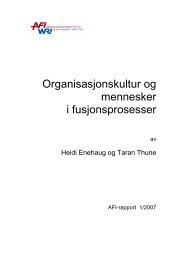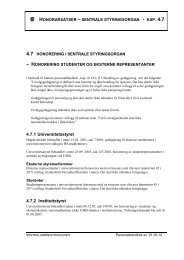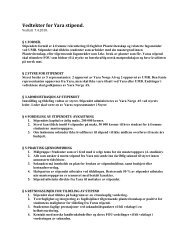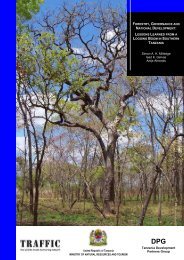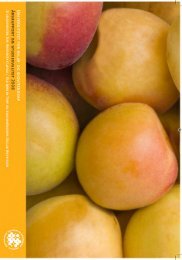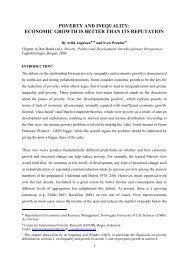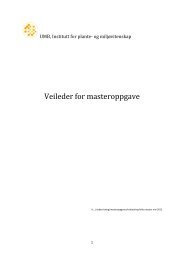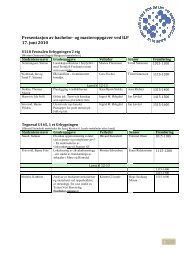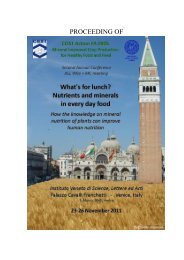Sustaining Livelihoods through Organic Agriculture in Tanzania - UMB
Sustaining Livelihoods through Organic Agriculture in Tanzania - UMB
Sustaining Livelihoods through Organic Agriculture in Tanzania - UMB
Create successful ePaper yourself
Turn your PDF publications into a flip-book with our unique Google optimized e-Paper software.
- adopt<strong>in</strong>g novel technologies and practices; and<br />
- community-based with proven impacts.<br />
Thus a purposive sampl<strong>in</strong>g strategy was adopted which selected projects on the basis<br />
of 'best practice'. Purposive sampl<strong>in</strong>g of predom<strong>in</strong>antly 'good' projects, <strong>in</strong>itiatives and<br />
farmers as research partners has important implications for the overall applicability of<br />
the f<strong>in</strong>d<strong>in</strong>gs s<strong>in</strong>ce the cases chosen for <strong>in</strong>vestigation were not representative of farms<br />
<strong>through</strong>out the country. The 'limited geographical applicability of results' is a<br />
pervasive problem <strong>in</strong> all on-farm research (Krell, 1999).<br />
The choice of criteria was been <strong>in</strong>fluenced by a set of assumptions about the pathways<br />
to livelihood benefits <strong>through</strong> organic agriculture. It was assumed that organic<br />
agriculture would br<strong>in</strong>g benefits to smallholders when it was a co-operative type of<br />
project with strong social capital, both subsistence and trade orientation, local<br />
ownership and a process<strong>in</strong>g element.<br />
A two-tailed design was adopted <strong>in</strong> which cases from both extreme of a theoretical<br />
condition were deliberately chosen. The ma<strong>in</strong> proposition was that organic projects<br />
br<strong>in</strong>g the most benefits to smallholders when they successfully comb<strong>in</strong>e multiple<br />
objectives of food security and trade, and also strengthen social capital. Two types of<br />
organic project were sought:<br />
Type 1 – export trade focus<br />
Type 2 – subsistence and local trade focus.<br />
Besides this key difference <strong>in</strong> orientation, other variables identified <strong>in</strong> a typology of<br />
organic project types (agroecological conditions, accessibility, process<strong>in</strong>g and<br />
technology) were kept as similar as possible <strong>in</strong> order to be able to collapse other<br />
conditions. There were a number of other variables <strong>in</strong>clud<strong>in</strong>g certification<br />
arrangement and set-up that were dependent upon the ma<strong>in</strong> variable be<strong>in</strong>g exam<strong>in</strong>ed<br />
(orientation) and these were also expected to differ across the two case study sites.<br />
The Type 1 project was relatively typical of the organic sector <strong>in</strong> <strong>Tanzania</strong><br />
(approximately 70% of certified projects are firms produc<strong>in</strong>g organic commodities for<br />
export). The Type 2 project, on the other hand, is less typical s<strong>in</strong>ce there only 30% of<br />
certified projects are for the local market. Although this has consequences for the<br />
ability to generalise the f<strong>in</strong>d<strong>in</strong>gs, it was considered to be of secondary importance<br />
s<strong>in</strong>ce the advantage of the case study method is that one ga<strong>in</strong>s <strong>in</strong> terms of<br />
phenomenology.<br />
Case study preparation <strong>in</strong>volved development of a protocol (see Appendix 2) and<br />
screen<strong>in</strong>g of case study nom<strong>in</strong>ations. Key questions be<strong>in</strong>g addressed by the CSR were<br />
the same as the <strong>in</strong>itial questions of the whole study:<br />
- the impact of organic agriculture on livelihoods<br />
- pathways to livelihood benefits<br />
- strategies to strengthen the susta<strong>in</strong>ability of organic projects.<br />
In summary, therefore the case study was designed to undertake participatory problem<br />
analysis and participatory solution development. After consultation with different<br />
stakeholders it was decided that two projects <strong>in</strong> the Mkuranga district of the Coastal<br />
region would be <strong>in</strong>vestigated: one focus<strong>in</strong>g on organic cashew for export and the<br />
other, an association of local groups <strong>in</strong>volved <strong>in</strong> organic vegetable production for<br />
subsistence and local trade.<br />
32




